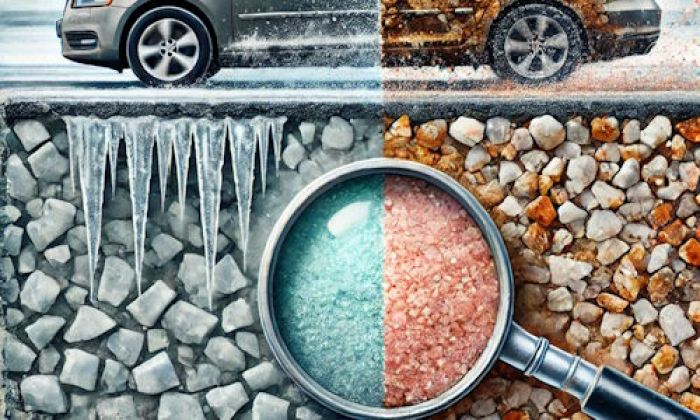A wobbly car on highways may mean that you have problems with your wheel alignment, wheel balancing, quality or condition of tires, or some suspension issue. Also, the problem may be caused by wrong tire pressure or bad wheel mounting.
Front suspension problems highlights
- Level of importance:high
- Common reasons:road potholes, speed bumps, age, mileage
- DIY inspection:possible but complicated
- DIY repair:usually,impossible
- Average price in shops:$250 - $800
- Average time:2 - 8 hours
- If ignored:fatal failure, no drive, expensive repairs

Most common reasons why your car feels wobbly on highways
When we drive in the city, we usually don't go over 30-35 MPH and the car may feel quite smooth even though it may have some problems. But when you go on a highway and speed up to more than 50 MPH, all problems show up and start torturing you making the quality of your driving much worse.
A wobbly car is one of the quite common symptoms that you shouldn't ignore. In most cases, it may mean that your vehicle is going through one of the following issues:
1. Wheel alignment problem
Wheel alignment defines the position of your wheels and the way they contact the road. If the alignment is optimal, the tire will touch the road with the entire working surface. But if there is a problem with alignment, the wheel may be tilted a little.
While this can feel OK in the city traffic, you will obviously feel some wobbling when on the highway. When the speed goes up, the wheel starts literally shaking from one side to another and at some point, this turns to a certain vibration.
It's almost impossible to see with the naked eye if the toe or caster is affected in your vehicle. You should plan a visit to a repair shop that can align wheels in cars and check this with special equipment.
But first, let's look at some other possible reasons for a wobbly car.
2. Tire balancing issues
Unbalanced tires are one more common reason for this issue. The problem is more or less the same as with poorly aligned wheels. Your wheel has some small weights on the inner side of the rim. These weights are used to optimally balance the entire wheel and let it rotate without any vibrations.
These wheels are fastened to the wheel when you have your tires changed. Sometimes, the small weights may fall off the wheel and your tire becomes unbalanced. This means that the wheel starts vibrating at higher speeds.
Solving this problem is easier than wheel alignment. Just go directly to the nearest tire service and let professionals rotate your wheels to see if everything is OK. This is not that expensive and tire rotation should be done at least once a year.
3. Damaged wheel or tire
After you hit a pothole or two, your tire or wheel rim may be damaged. A bent rim will obviously lose all its perfect settings and will start wobbling. Tires may get different kinds of damage including lumps on them. These lumps may become quite big and will just disturb you from driving smoothly.
After you hit a curb or a pothole on the road, inspect your wheels carefully and see if there aren't any damages. Pay attention to the inner side of the wheel that is hard to see. Sometimes, you will even want to unscrew those wheel bolts to take the wheel off and see what happened to it.
Damaged tires are not good to use anymore. If you want to buy a new tire, remember that the best solution is to buy at least two tires and replace them on the axle. If the tire set is quite old, you better buy four new tires.
Rim damages are sometimes repairable. The only problem that shouldn't be repaired is a cracked wheel rim. If you see cracks, better replace the rim with a new one.
4. Wrong tire pressure
It's quite obvious that tire pressure affects the quality of your driving. Checking the pressure regularly is extremely important. If you have the TPMS in your car, just activate it and see if there is a problem with one of the wheels when your car starts wobbling on highways.
If you don't have the TPMS, use the wheel compressor that has the air gauge in it. You may try to ask for help from other drivers if you don't have a wheel compressor in your car.
But if the wheel looks OK and doesn't seem flat, you may keep driving slowly until you reach the next tire service. They will use professional manometers to see if there is a problem.
If your tire keeps losing pressure after you add it with a compressor, the problem might be with the tire itself. Again, you should go to the tire service and they will check this thoroughly and will even repair the tire if needed.
5. Loose wheel bolts
You will feel that your wheel bolts are loose much sooner than you go on a highway, but this issue is still worth checking up on. If one of the bolts in your wheels is loose, the wheel will start shaking like crazy.
You may easily check this up on your own. In each vehicle, there is a wheel wrench in the trunk, right under the floor cover. Take the wrench and try to fasten the wheel bolts. Normally, they are fastened so toughly that you can't even move them with just the power of your hands. If you can, the certain wheel bolt is obviously loose. Tighten it as hard as you can with your hands.
The next step is to slowly and carefully drive to the tire shop or repair shop and have all the bolts checked with the torque wrench.
6. Suspension problems
Another issue that may cause the wobbling problem is a broken suspension part. If your suspension is not OK, it may go crazy in many different ways, including wobbling on highways.
Among suspension parts that may be broken are the strut, the spring, the hub, the suspension lever, some bushings, steering system rods, rod ends, the stabilizer, etc. Unfortunately, troubleshooting your car on the roadside is almost impossible, so you will need to decide whether it's safe to drive further. Anyway, if you decide to drive, do it slowly and carefully.
Your next destination should be the repair shop where you can have the vehicle inspected.
What should you do if you feel a wobbly car on the highway?
So, I recommend the following steps when you reveal that your car is wobbling at high speed:
- First of all, find a safe place and stop your vehicle immediately to avoid any steering losses and possible collisions.
- Take your time and inspect everything you can inspect using the list of possible issues above.
- If you found the issue, decide whether it's safe to drive till you reach the nearest shop or not.
- If you can't locate the issue, try driving your car carefully.
- Register that speed when you start feeling the wobble in your car.
- Drive at a much lower speed than you start feeling wobbling and be very careful - drive on the right side of the road.
- Plan the visit to the repair shop or tire shop near you.
- If you feel that driving is dangerous (you lose traction or steering), stop your car immediately and call a tow truck.
You shouldn't drive your car even at a very slow speed if you suspect it's not safe. The best solution, in this case, is to call a tow truck and have your vehicle towed safely to the dealership or a trusted repair shop. This will allow you to save your life and health and also to save your car from getting into a road accident.
How much is it to repair a wobbly car?
It's hard to estimate how much you will pay for repair, in this case. If the problem is with a poorly rotated wheel, the repair will cost you just a couple of dollars. While a problem with suspension may cost several hundred dollars to solve.
But, in most cases, it won't cost you a fortune to solve the problem with a wobbly car on highways. Just go to the tire shop or repair shop and ask them how much they will take for the required job. Anyway, DIY repair is not appropriate here.
The condition of your wheels and tires is extremely important for smooth and safe driving. It means you should solve this problem as soon as possible.
About the authors
The CarAraC research team is composed of seasoned auto mechanics and automotive industry professionals, including individuals with advanced degrees and certifications in their field. Our team members boast prestigious credentials, reflecting their extensive knowledge and skills. These qualifications include: IMI: Institute of the Motor Industry, ASE-Certified Master Automobile Technicians; Coventry University, Graduate of MA in Automotive Journalism; Politecnico di Torino, Italy, MS Automotive Engineering; Ss. Cyril and Methodius University in Skopje, Mechanical University in Skopje; TOC Automotive College; DHA Suffa University, Department of Mechanical Engineering






Add comment